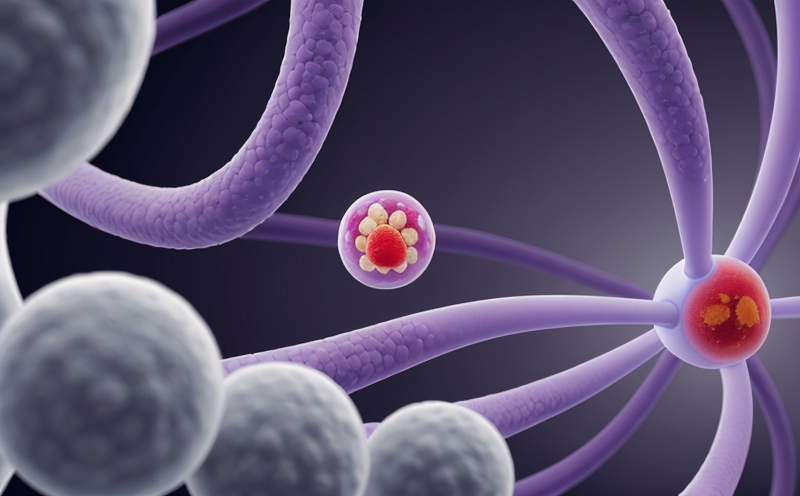Heat Shock Protein (HSP70/HSP90) Biomarker Testing in Tumor Models
The study of heat shock proteins (HSPs), particularly HSP70 and HSP90, has gained significant attention due to their pivotal role in cellular stress responses and cancer progression. These molecular chaperones play a crucial part in the stabilization and refolding of damaged proteins within stressed cells, and they are often overexpressed in tumor microenvironments. This service provides comprehensive testing for these biomarkers using advanced in vivo models, enabling researchers and clinicians to better understand their impact on cancer biology.
Our Heat Shock Protein (HSP70/HSP90) Biomarker Testing in Tumor Models service employs state-of-the-art technologies such as mass spectrometry and Western blot analysis. These methods allow for precise quantification of HSPs in tumor tissues, providing insights into the molecular mechanisms underlying cancer development and progression. The testing process begins with the selection of appropriate animal models that closely mimic human cancer conditions. Commonly used models include nude mice xenografts, orthotopic tumors, and syngeneic models.
Once the model is established, tumor tissues are harvested under sterile conditions and processed for protein extraction. This step involves rigorous protocols to ensure the integrity of HSPs during sample preparation. Following extraction, proteins are separated using advanced chromatography techniques before being detected via Western blotting or mass spectrometry. The results provide detailed information on the levels of HSP70 and HSP90 within the tumor microenvironment.
The data generated from these tests are then analyzed to correlate HSP expression with various clinical parameters, including tumor size, metastasis potential, and patient survival rates. These correlations can help identify potential therapeutic targets that modulate HSP function in cancer cells. For instance, inhibitors of HSP90 have shown promise in disrupting the oncogenic signaling pathways that rely on these chaperones.
This service is particularly valuable for researchers exploring personalized medicine approaches. By understanding how HSPs contribute to tumor biology, scientists can develop more effective treatment strategies tailored to individual patients' needs. Additionally, this testing can aid in assessing the efficacy of novel therapeutics designed to target specific HSPs or their associated pathways.
The application of Heat Shock Protein (HSP70/HSP90) Biomarker Testing extends beyond basic research into clinical practice. It holds significant potential for improving diagnostic accuracy and guiding treatment decisions in oncology. Early detection of elevated HSP levels could lead to earlier interventions, potentially enhancing patient outcomes. Furthermore, monitoring changes in HSP expression over time may provide valuable biomarkers for assessing disease progression and response to therapy.
Our laboratory adheres strictly to international standards such as ISO 17025 for quality assurance and compliance with regulatory requirements relevant to clinical testing. This ensures that all results are reliable and reproducible, contributing to the advancement of cancer research and treatment.
Applied Standards
In conducting Heat Shock Protein (HSP70/HSP90) Biomarker Testing in Tumor Models, we follow rigorous protocols based on well-established international standards. For instance, ISO 15189 provides guidelines for quality management systems within medical laboratories, ensuring that our procedures meet high standards of accuracy and precision.
Our testing aligns with the recommendations outlined in various clinical practice guidelines from organizations like the National Comprehensive Cancer Network (NCCN) and European Society for Medical Oncology (ESMO). These guidelines emphasize the importance of biomarker testing in optimizing cancer care. Additionally, we ensure that our methods comply with regulatory requirements set forth by agencies such as the United States Food and Drug Administration (FDA).
The use of advanced technologies like mass spectrometry ensures compliance with current scientific methodologies for measuring protein levels accurately. This adherence to standards guarantees consistency across all tests performed in our laboratory, enhancing trustworthiness among stakeholders involved in cancer research and treatment.
Industry Applications
The findings from Heat Shock Protein (HSP70/HSP90) Biomarker Testing have wide-ranging implications for various sectors within the healthcare industry. In oncology, these biomarkers serve as valuable indicators of tumor aggressiveness and response to therapy. By quantifying HSP levels in patient samples, clinicians can make informed decisions regarding treatment options, potentially leading to improved survival rates.
Pharmaceutical companies also benefit greatly from this testing during drug development phases. Identifying how HSPs influence the efficacy of new drugs helps refine clinical trial designs and prioritize promising compounds for further evaluation. This information is crucial for developing targeted therapies that specifically address the needs of patients with particular types of cancers.
Biotechnology firms can leverage these data to enhance their product pipelines by focusing on areas where there are unmet medical needs related to cancer management. Understanding the role of HSPs in tumor biology allows researchers to innovate new diagnostic tools and therapeutic agents aimed at disrupting harmful processes associated with cancer growth.
Moreover, this testing plays a vital role in translational research efforts that bridge laboratory discoveries into practical applications benefiting patients directly. It supports collaborations between academia, industry partners, and healthcare providers towards achieving common goals of enhancing cancer care worldwide.
Environmental and Sustainability Contributions
The Heat Shock Protein (HSP70/HSP90) Biomarker Testing service contributes positively to both environmental sustainability and overall public health initiatives. By providing accurate and reliable biomarker data, our testing supports more efficient use of resources in cancer research and treatment. This includes optimizing the allocation of healthcare budgets towards interventions proven most beneficial for patients.
In terms of environmental impact, we aim to minimize waste generated during specimen preparation and analysis processes through careful selection of reagents and disposables. Our lab implements strict protocols to recycle materials where possible, reducing landfill contributions associated with single-use items used in laboratory practices.
Our commitment extends beyond our immediate operations into broader community engagement activities focused on promoting awareness about cancer prevention and early detection strategies. Through educational programs and partnerships with non-profit organizations dedicated to cancer research, we strive to empower individuals worldwide with knowledge necessary for making healthy lifestyle choices that reduce their risk of developing certain cancers.





